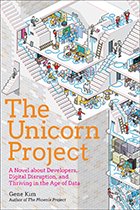Gene Kim explores DevOps transformation in 'The Unicorn Project'
This chapter excerpt from Gene Kim's 'The Unicorn Project' touches on one of the book's core themes: Roadblocks occur when developers, ops and business leaders are misaligned.
Juggling a mix of technical, cultural and organizational challenges, many enterprises still find themselves in the thick of DevOps transformation. And while these efforts can lead to significant IT and business wins, they're often impeded by years of technical debt mismanagement, inefficient processes and complex dependencies between dev and ops teams.
The Unicorn Project: A Novel about Developers, Digital Disruption, and Thriving in the Age of Data -- Gene Kim's follow-up book to 2013's The Phoenix Project -- provides a fictional (yet, for many readers, relatable) account of the challenges an organization faces on its quest to modernize IT and software development practices. The Unicorn Project revisits the same company portrayed in The Phoenix Project -- car parts manufacturer, Parts Unlimited -- as it pushes on with its attempt to stay relevant in the digital age via an initiative called The Phoenix Project.
But this time, the story is told from the point of view of senior developer and architect Maxine, rather than Bill Palmer, director of IT operations, who served as the protagonist in the first book in the series. As a form of punishment for her involvement in a payroll system flub, Maxine is forced to work as a developer on The Phoenix Project, which, despite being the crux of the turnaround plan for Parts Unlimited, has a reputation for being unproductive, unorganized and very much behind schedule.
While told from the eyes of a developer, The Unicorn Project still has much to portray about the evolving role of IT operations teams, and the critical part they play in a business' DevOps transformation. In an interview with TechTarget, Kim said he hopes operations admins walk away from the book with a sense of excitement -- namely, a belief that the best days of infrastructure and operations are ahead of them, not behind.
The Five Ideals
In The Phoenix Project, Kim introduced the concept of the Three Ways -- or three core principles that promote DevOps -- and the Four Types of IT Work.
In The Unicorn Project, readers walk through The Five Ideals, or concepts that help drive significant and positive change within the business and IT. These include:
- Locality and simplicity -- don't underestimate the significance of smaller-scale changes to a single software or infrastructure component.
- Focus, flow and joy -- provide quick feedback on code so developers can stay focused and enjoy their day-to-day work.
- Improvement of daily work -- implement systemic fixes to streamline daily tasks.
- Psychological safety -- ensure all staff feels comfortable and empowered to share their opinions openly.
- Customer focus -- instill a culture where leaders across all functional silos focus on what the organization as a whole, and its customers, need long-term.
"It's not to say that a storage administrator or a network administrator or a system administrator … can continue to work as we've worked for the last 20 years [and] everything is going to be fine," Kim said. "That's not what I'm asserting."
 Gene Kim
Gene Kim
Instead, he continued, operations admins need to embrace the change that DevOps and IT modernization brings, and rise to the challenge of continuous learning -- whether that learning pertains to a new business or IT process, tool or mindset.
"It's a very vibrant landscape right now," Kim said. "Things are changing faster than ever, and it does mean that we have to learn more, and I can certainly appreciate how bewildering [that feeling is]."
It's crucial for IT ops teams, in particular, to explore new ways to work hand-in-hand with developers, as well as provide the architectures, systems and resources that support, and ultimately help achieve, development and business goals.
"We as infrastructure specialists, networking specialists, security specialists -- our job is to alleviate those burdens from developers and make sure that everyone can work safely and securely and get what they need," Kim said.
Due out November 26th, The Unicorn Project emphasizes how important it is for IT ops, developers and the business, for that matter, to work together toward a common goal. It also captures the frustration and setbacks that occur when that organizational synergy doesn't exist.
Below is a brief excerpt from chapter 3 of the book, where Maxine is relieved to finally receive access to her dev environment for The Phoenix Project -- only to quickly feel defeat when she realizes there are, in fact, more hoops to jump in the IT approval and provisioning process before she can actually get coding.
"Maxine whoops in delight—progress, at last! Santa just mobilized his magical elf army to start building the Dev environment that she so desperately needs. The cavalry is finally coming!
Exhilarated, she read through all the tickets. So much work is being dispatched to what appears to be the entire Ops organization. Maxine suddenly becomes alarmed at just how many people are required to create one environment.
She works at her desk, planning out what she'll do first with her Dev environment, when her phone starts buzzing incessantly. Opening her emails, her jaw drops at the forty notifications in her inbox. At the top of her screen are a flood of new notifications marking all her tickets as closed.
'No, no, no,' she moans, starting to trace through the ticket history from the beginning. She sees that the user accounts were created, the mount points configured, but then she sees a note from one of the storage administrators:
I'm sorry to have to close your ticket. Believe it or not, we've been out of storage space for the last three months. We have a big order for more storage that we can't expedite until January, and worse, all the controllers are already at capacity. Purchasing says we can only order twice per year to get the best quantity discounts with our vendors. You are near the top of the list, so we'll get this scheduled for February.
Maxine blinks.
It's September.
Phoenix is the most important project in the company. They've spent $20 million over three years. And yet, here she is, trying to help, and they won't spend $5,000 on more disk space. And now she won't get a Dev environment for five months! She buries her head in her hands and silently screams down at her keyboard."
Click here to access more chapter excerpts and get a sneak peek at The Unicorn Project.
Editor's note: This excerpt is from The Unicorn Project: A Novel about Developers, Digital Disruption, and Thriving in the Age of Data authored by Gene Kim, published with IT Revolution Press, November 26, 2019, ISBN: 9781942788768.







